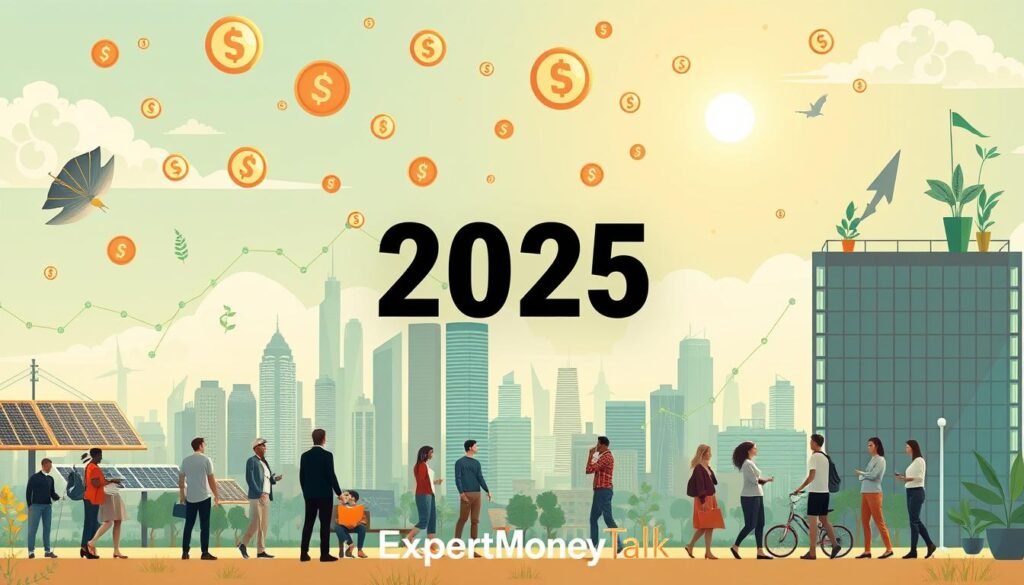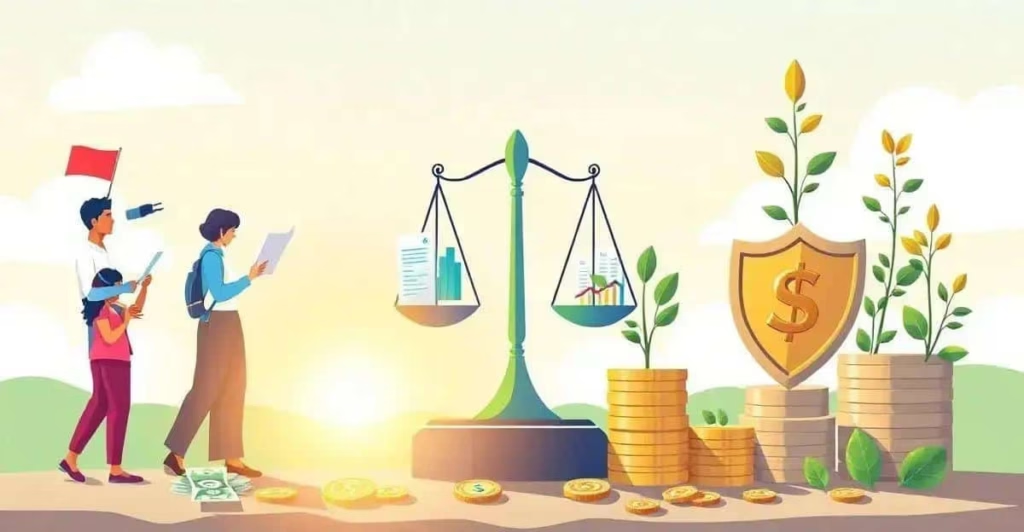As you enter 2025, have you thought about what financial goals will change your future? A huge 89% of Americans have set a main financial goal for this year. It’s key to focus on good money management, like cutting debt, making budgets, and saving1.
In a time with rising prices and higher borrowing costs, spending time on smart financial planning for 2025 is crucial. It helps keep your wealth safe and ensures a secure financial future2. This guide will share important personal finance tips. They are designed to help you face challenges, like saving more and earning more while paying off less debt3.
Personal Finance Tips for 2025 in USA
Knowing how to manage your money is key in 2025. Reviewing your budget can help you spot where you spend too much. With 89% of Americans aiming for a financial goal in 2025, getting good at budgeting is crucial4.
Aligning Financial Goals with Lifestyle Changes
Financial goals are most effective when they align with your personal lifestyle. For example, if you’re planning to move or start a family in 2025, adjust your savings and investment plans to accommodate these changes.
Prioritize goals that support long-term stability without compromising current necessities. Regularly reviewing these plans ensures they stay relevant as your circumstances evolve
Budget Review and Analysis
First, check out your current budget. Experts say to watch your spending closely to find ways to save. About 30% of Americans spend too much on things they don’t need, which can hurt their finances4.
Try the 50/30/20 rule for saving. It means 50% for needs, 30% for wants, and 20% for savings or paying off debt.
Building Financial Resilience Through Diversification
Diversification is a cornerstone of financial stability. In 2025, spreading your investments across asset classes like stocks, bonds, real estate, and mutual funds can reduce risk.
This strategy ensures that underperformance in one area is offset by gains in another, keeping your portfolio balanced and resilient to market fluctuations.
The Role of Education in Financial Success
In 2025, improving financial literacy is a game-changer. Consider enrolling in online courses or attending workshops on personal finance topics like investment strategies, tax optimization, and credit management.
Learning these skills empowers you to make informed decisions and adapt quickly to financial changes, ensuring long-term success.
Setting Clear Financial Priorities
Establishing financial priorities can help you focus on what matters most. Begin by listing your top financial goals—whether it’s paying off debt, saving for retirement, or buying a home. Ranking these goals ensures you allocate resources effectively, even when unexpected expenses arise.
Revisit your priorities monthly to stay aligned with your progress and adjust for changes in income or expenses
Emergency Fund Planning
Building an emergency fund is a must. Aim to save three to six months’ worth of expenses for unexpected costs5. With 12% of Americans wanting to save more for emergencies, it’s clear how important it is4.
Having this fund helps you avoid financial shocks without messing up your budget.
Family Financial Planning for Multigenerational Households
More families in the U.S. are adopting multigenerational living arrangements. Financial planning in these households requires open communication about shared expenses and savings goals.
Creating a joint financial plan for rent, groceries, and utilities helps avoid conflicts while building stronger financial foundations for all members involved and is one of the most important personal finance tips.
Green Investments for a Sustainable Future
Incorporating sustainability into your financial planning is not only ethical but also profitable. Green bonds and eco-friendly ETFs are gaining traction as solid investment options.
These investments align with global environmental goals and often offer competitive returns, making them ideal for those looking to combine purpose with profit.
Side Hustles and Additional Income Sources
In 2025, exploring side hustles can significantly boost your financial health. Consider options like freelancing, selling handmade goods online, or even participating in the gig economy.
Supplementing your income not only provides financial stability but also accelerates progress toward major financial goals. Allocate this extra income strategically—toward debt reduction, investments, or savings.
Debt Management Strategies
Managing debt is vital for your financial health. With $1.17 trillion in credit card debt in the USA, focus on high-interest debts first4. 21% of Americans are working to pay off debt as their main goal4.
Use the snowball or avalanche methods to tackle your debt. Setting clear goals for paying off debt keeps you motivated.
The Impact of Health Care Costs on Financial Planning
Healthcare costs continue to rise, making them a critical factor in budgeting for 2025. Consider contributing to a Health Savings Account (HSA), which offers tax advantages and helps cover medical expenses.
Planning for potential out-of-pocket costs ensures that health-related emergencies don’t derail your financial goals.
Navigating Rising Interest Rates
Interest rates remain a critical factor in personal finance decisions for 2025. Higher rates can increase borrowing costs, but they also benefit savers. Consider moving idle funds to high-yield savings accounts or certificates of deposit (CDs).
If you’re managing a mortgage, refinancing to lock in a lower rate could save thousands over the loan’s lifespan.
Investment and Retirement Planning Updates
Investment and retirement planning are key to securing your financial future. It’s important to maximize contributions to accounts like 401(k)s and Roth IRAs. In 2025, consider using the highest lifetime gift and estate tax exemption of $13.99 million per individual to reduce future estate tax6.
With 77% of American investors worried about inflation affecting their retirement, it’s crucial to review your investment strategies USA. Use personal finance software to track your investments and make needed changes6.
Remember, 26% of non-retirees plan to delay retirement due to inflation’s impact on their savings6. Look into passive income ideas 2025 for extra financial security in retirement. Tax-loss harvesting is a good strategy to offset income by selling underperforming securities7. Also, consider putting part of your annual raise into retirement savings for growth.

Understanding Inflation-Protected Investments
Inflation remains a top concern for savers and investors. Explore Treasury Inflation-Protected Securities (TIPS) and other inflation-hedged assets to preserve the purchasing power of your savings.
Balancing your portfolio with diverse asset classes, such as real estate or commodities, can further shield your investments from inflationary pressures.
Smart Tax Planning and Credit Management
As you plan your personal finance tips for 2025, smart tax planning is key. Learning about tax planning 2025 can lower your taxes and use more deductions. The federal estate and gift tax exemption will rise to $13.9 million on January 1, 20258.
It’s important to be ready, as these rules might change after that date8. Knowing these rules can greatly affect your financial plan.
Tax Optimization Strategies
To better your taxes, think about saving in tax-friendly ways. In 2025, you can save up to $23,500 in 401(k) plans and $7,000 in traditional IRAs. If you’re 50 or older, you can add $7,500 to 401(k) plans9.
You can also deduct up to $3,000 from your income for investment losses8. Keeping up with federal reserve interest rates can guide your savings and investments.
Credit Score Improvement Tips
Keeping a good credit score is vital for better loan terms. The average credit card rate is about 21% to 23%9. Personal finance tips like paying bills on time and checking your credit report often can improve your score.
Also, knowing how your credit usage affects your score is important for planning.
Document Security Management
Good document security management is crucial when planning taxes. With more data breaches, protecting your info is vital. This means keeping documents safe, using secure online storage, and changing passwords often.
Be careful with your identity, especially during tax season when it’s at risk.

Understanding how taxes and credit work together is key for financial stability8910.
Leveraging Technology for Personal Finance
The rise of financial apps has made managing money simpler than ever. Apps like Mint and YNAB (You Need a Budget) offer budgeting tools, expense tracking, and insights to help optimize spending.
Automating your savings with technology can also prevent overspending. For instance, setting up auto-deposits into a savings account ensures consistency in reaching your financial targets.
Digital Financial Security Measures
In today’s digital world, keeping your finances safe online is key. Many people don’t realize the dangers of online threats. Using personal finance software can help track spending and save money, boosting your financial health.

Make strong passwords and consider using a password manager for better security. Good passwords combine unique characters and passphrases. Don’t trust your browser to store passwords, as it can risk your information. Adding two-factor authentication (2FA) is a smart move to protect against unauthorized access.
Be careful of phishing scams that trick people into giving away their info. These scams are getting smarter, trying to look like real messages. Always check if messages are real before giving out your financial details.
By following these personal finance tips, you’ll not only keep your info safe but also improve your financial health over time. These steps will make your online accounts safer and help you find ways to save money. For more info, see111213.
Housing and Insurance Strategies
Your approach to housing and insurance can greatly affect your financial stability. It’s important to consider property investment, especially with changing market trends. Keep an eye on mortgage rates, as they are influenced by the Federal Reserve’s actions.
Property Investment Considerations
Investing in property can be challenging but offers great financial growth. With many unable to save, affordable housing is in high demand. This makes it crucial to think about the future of housing prices and availability.
Insurance Coverage Updates
It’s vital to keep your insurance policies up to date. This ensures you’re covered without spending too much. For example, safe drivers can save a lot by choosing usage-based car insurance.
Cost Management Tips
Managing your costs is key for budgeting and investing. Many are focusing on financial stability. Here are some personal finance tips:
- Create a detailed budget for housing expenses.
- Cancel unused subscriptions, as Canadians have many.
- Build an emergency fund, as it’s seen as effective.
By staying informed, you can make smart choices. These choices will help you achieve your financial goals and grow your wealth over time1415.
Conclusion
As we wrap up this guide, 2025 looks like a great time to improve your money management. By following the advice on debt, investments, and taxes, you can create a financial plan that fits your goals. Almost half of Americans struggle to make ends meet, showing the importance of smart money handling16.
Setting clear financial goals helps you track your progress and stay motivated17. Using tools like automatic savings can help you reach your long-term dreams, like retirement or vacations16. Also, tackling short-term debts and getting insurance provides immediate stability and a strong base for growth.
Small steps in your financial planning can lead to big success. They help you feel more in control of your money17. As the economy changes, being proactive with your money is key. By staying flexible and mastering money management, you can build a better future16.
Remember, your path to financial health in 2025 begins with the steps you take now.
FAQ
What personal finance goals should I focus on for 2025?
How much should I save for an emergency fund?
What debt management strategies are recommended?
Why is investment planning important for 2025?
What are some effective tax optimization strategies for this year?
How can I improve my credit score?
What digital security measures should I take for my finances?
How do I evaluate property investment opportunities?
What should I consider regarding my insurance coverage?
Source:Yahoo!Finance | Related articles: Article 1 / Article 2




